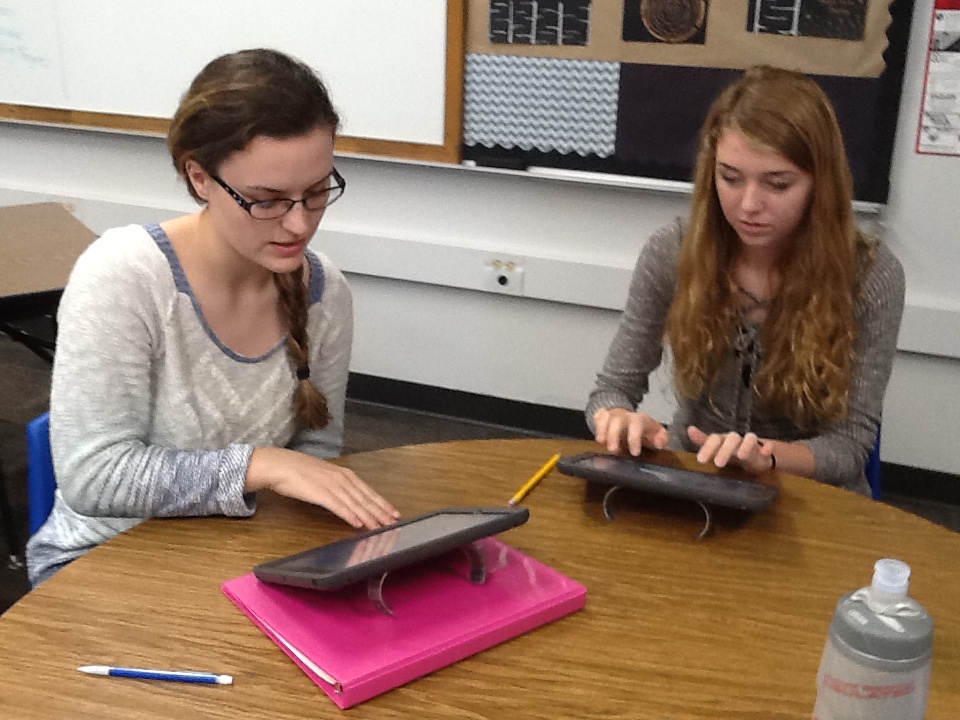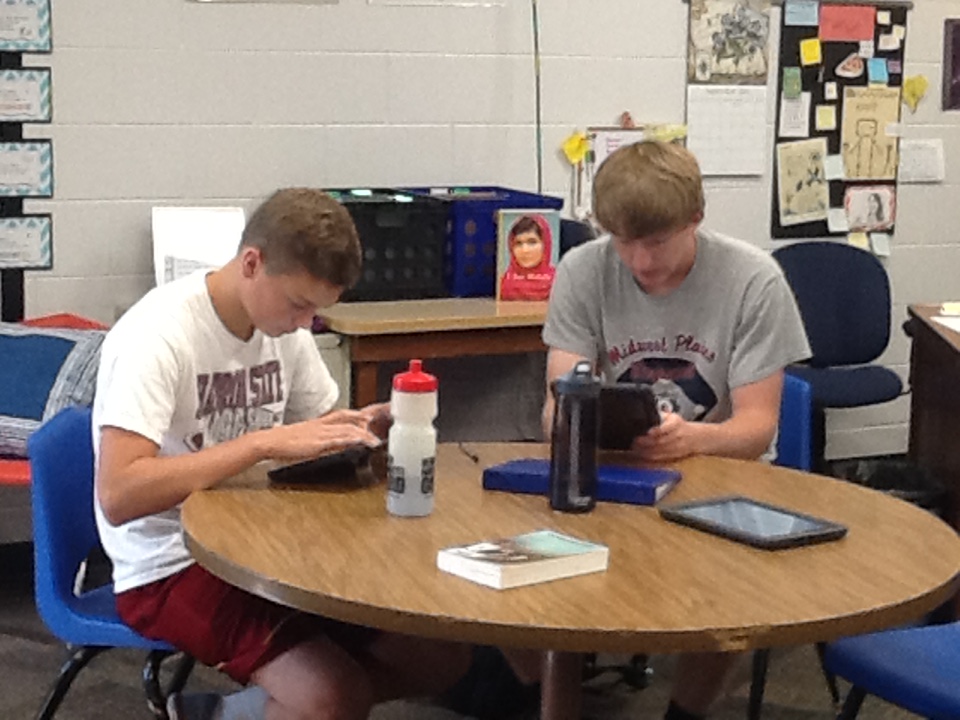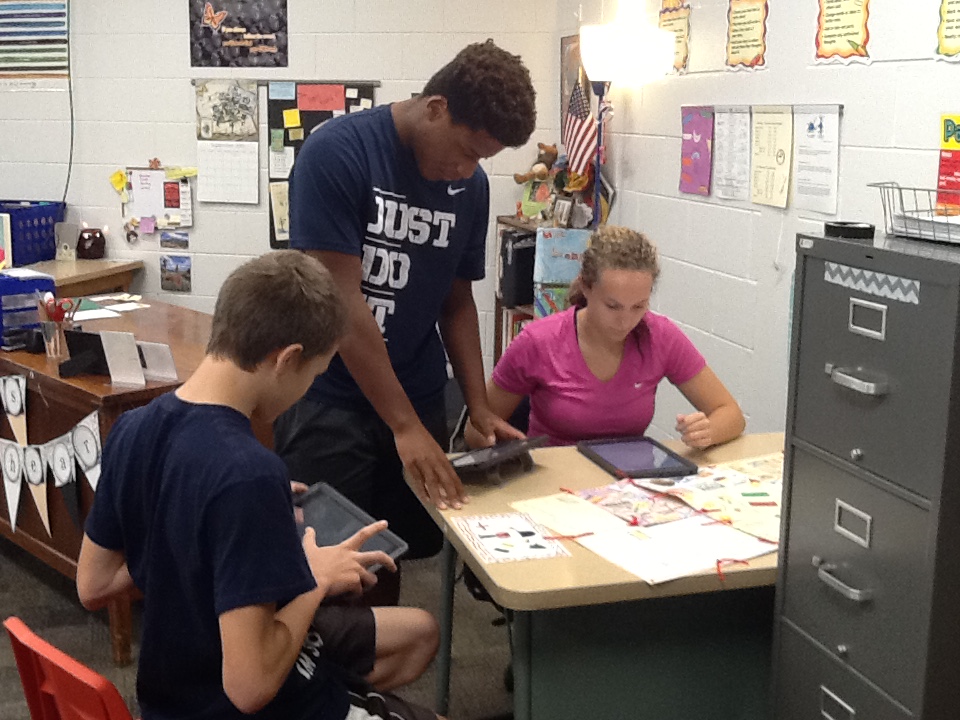Our Theme for English III
A Blog Entry Written Collaboratively by Mrs. Lanphear’s Block 1 & Block 2 Classes
Intro to Class
You don't have to be crazy to be in English III, but it helps. With a plethora of American authors and Mrs. Lanphear herself, you'd be in good company. By picking apart the classics, we find tidbits we can use in our own writing. We span our learning from the 19th Century to the Information Age; we've branched into and embraced technology. Despite our collective insanity, we've all got something interesting to say: this is our theme for English III.
Mindly
Integrating technology into our lessons is quintessential to the English III class. We use several apps to further our education in American literature including one called Mindly. Abby Orton discovered the app and introduced it to the class for our Alice Walker project. Students utilized the app to organize ideas about Alice Walker's writing using main points and anecdotes to study the piece. The essence of "In Search of Our Mother's Gardens" is creativity, which we connected using our mind(ly) maps.
Alice Walker’s Personal Essay
As the English III classes dove into our literature books for the first time, we began with an interesting personal essay titled: "In Search of Our Mother's Gardens," written by author Alice Walker. Walker is a product of an African American, impoverished family and the memories from her childhood, particularly of her mother, inspired this unique work. While searching for a deeper meaning to the essay, classes discovered the main idea of the piece was simply that despite difficult times and rough circumstances, the creative spirit that lives within someone does not have to be dulled and is grown within families. Walker points out, "I went in search of the secret of what has fed that muzzled and often mutilated, but vibrant, creative spirit that the black woman has inherited, and that pops out in wild and unlikely places to this day" (Walker 1295). This essay broadened our knowledge of American literature, as well as provoked thoughts on what "creative spirit" means in our own lives!


Perspectives on Creativity
Creative perspectives range from person to person depending on age, gender, and societal views. Younger children are more openly creative, while adult males find it difficult to define creativity. When asked the question, "What is the most creative thing that you do?" adult males at the high school struggle to answer; however, younger children respond without thought. Children are more likely to think outside the box. Our class concludes that society has taught children to think differently about creativity, regardless of gender.
Langston Hughes & Closing Reading
Our class also studied a great African American poet, Langston Hughes, and his American experience. We investigated his poem, "Theme for English B," multiple times using the close reading plan. Through popular vote, we decided upon which skill to expand on, such as: finding the main idea, determining the author's purpose and making inferences. As a group, we discussed the similarities and differences that were caused by race discrimination, the theme of the poem, and the different perspectives on American experience. To test our individual skills, each student was asked to identify who, what, when, where, why and how the author described his experience.
Read the poem.
The Result of Close Reading
After a close reading and discussion of "Theme for English B," it was discovered that many students connected to the text. One of the lines in particular: "I guess being colored doesn't make me not like/ the same thing other folks like who are other races," was especially relatable to our class. In high school, no matter where you are, students are always faced with stereotypes, and classified by their pursuits and appearances. Hughes struggled with this because his skin color set him apart from his Caucasian counterparts, who had the same passions and preferences as he did. This revealed a new perspective--although groups may be stereotyped for their perceived preferences and passions, we are individuals with many surprising common interests.
Quilt Exploration
Next, our instructor told us to go home and explore our lineage. Not only did we discover our own cultures, but other classmates' cultures as well. We connected with each other through our heritage and our family's passed down creativities. Our origins brought us together and sparked interesting class discussions, including the difference of women and men's knowledge of heritage. We found that the women knew exceedingly more when it came to historical information, sparking many heated and involved discussions about gender roles in our families. We connected not only to our families, but to each other through intriguing facts, culture, and information about heritage.
Quilt Family Histories: Part 1
The second block of English III is chock-full of interesting stories involving the students' ancestors. The stories range from jail breaks in New Mexico to setting up schools in Alaska. In the early 1900s, a student's great-great-uncle bought and sold stolen horses. Although he did not know they were stolen, he went to jail; however, his brothers quickly broke him out. One extraordinary story included a relative getting struck by lightning twice and living to tell the tale. A different student’s ancestor was a self-made millionaire and used his money to build new schools in Alaska. These are just a few of the many exhilarating family stories discovered as a result of our English III assignment.

Quilt Family Histories: Part 2
We learned many interesting facts about our fellow classmates' history from the quilt blocks. There were many famous and infamous characters in our classrooms' history. Walt Mays's quilt contained a story about how two of his ancestors traveled on the Mayflower. John Billington, one of these ancestors, was the first person hanged in the New World. April Hardy's story was about how she is related to Blackbeard and the Vikings. Daniel Smith's quilt told a story about his ancestor, John Chapman-- alias Johnny Appleseed. Our classmates have many varying traditions and unique cultures. Shaylee Gunwall's quilt explains how her family makes homemade ravioli and pasta sauce passed down by her family. Aries Ottesen's family has cookies, chocolate cake, and fattigman (a Norwegian cookie or pastry) passed down in her family. All in all, we learned that each of us have stories and physical items passed down from our ancestors that are an important part of our families.
In Closing
So far in this course, our class has discussed the differences between race and gender, and used technology to present and share our ideas. Our theme for English III is to investigate American voices, including our own. Recently, we used social media to inform others about our favorite books and why they should read them too! We shared our recommendations on Twitter using: #CHSreads. This year, English III has already been full of learning, and we're sure that we will continue to discover new American experiences and expand our perspectives.












